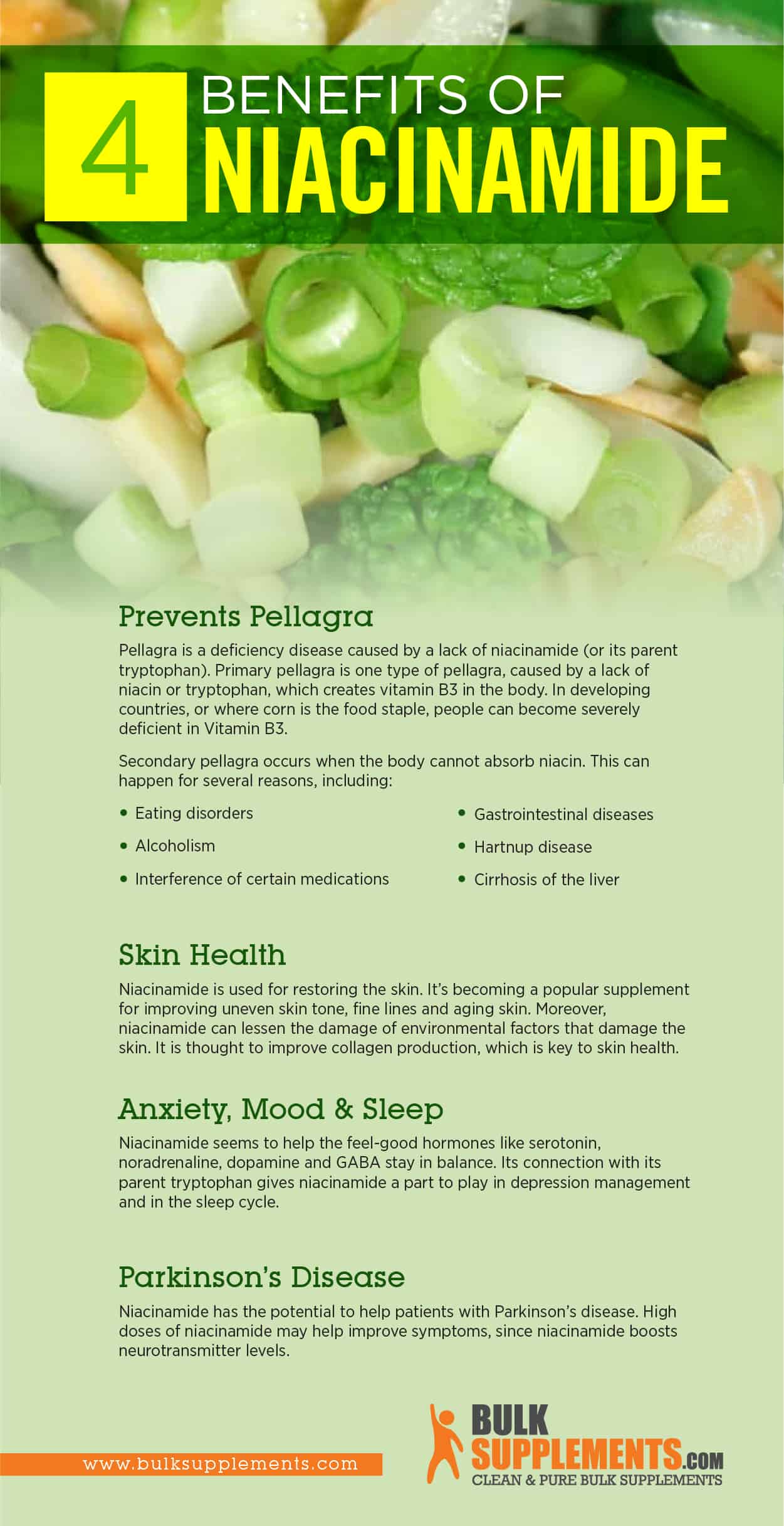Niacinamide (Vitamin B3) Benefits & Side Effects
by James Denlinger Digital Marketing StrategistWhat is Vitamin B3?
Vitamin B, also known as niacinamide, is an essential, water-soluble vitamin made naturally within the body. It’s a useful antioxidant, providing benefits such as:
- Boosting skin health
- Easing arthritis
- Repairing DNA
- Preventing pellagra, the niacin deficiency disease
Vitamin B3, like other B vitamins, helps convert food into energy.
It does this as a major element in two enzymes that are part of the metabolism process. Vitamin B3 also plays a part in creating and repairing DNA. Moreover, niacin is one of the most important nutrients because it is needed for your entire body to function.
A diet devoid of vitamin B niacinamide is rare in developed countries, but throughout history, the lack of niacin has been a deadly problem.
Discovering Niacin Through Pellagra
In ancient history, the disease pellagra was virtually unknown. When corn was introduced in Europe, though, pellagra’s presence became well-documented. Due to the widespread use of corn as a staple in the Italian diet, pellagra increased (corn contains a form of niacin that humans have trouble absorbing).
Pellagra eventually became a large health problem in the southern United States in 1900. It followed a new method of processing grain — one that removed many of the nutrients. Doctors finally began a search for the cause of pellagra and the federal government commissioned Dr. Joseph Goldberger to study the disease. He was the first to isolate and identify niacin in 1915.
Where Does Niacinamide Come From?
Vitamin B3 comes from four elements; nicotinic acid, tryptophan, nicotinamide and nicotinamide riboside. Vitamin B3 goes by various names, including niacin, niacinamide, nicotinic acid, nicotinamide or nicomide.
But why all the names, and what’s the difference between each one?
Niacinamide, Niacin & Inositol Nicotinate
- The body generates niacin naturally. Its scientific term is nicotinic acid, and it comes in different forms, depending on its formation.
- Niacinamide is the form of niacin that generates from tryptophan, an amino acid. Its technical name is nicotinamide.
There are critical differences between these two vitamin B3 components. For example, niacin can support healthy cholesterol levels that are already within normal range. On the other hand, niacinamide is used to treat pellagra, combats aging, supports brain function, joint comfort and sugar levels.
Niacin
Niacin can treat high cholesterol levels. Niacinamide does not have this property because the amino acid involved in its creation inhibits this. Additionally, niacin can lower two kinds of “bad” cholesterol (LDL and VLDL) while boosting levels of “good” cholesterol (HDL). Incidentally, niacin therapy isn’t linked to lower rates of death, heart attack or stroke and should not be used to lower cholesterol levels. Statin drugs can effectively reduce bad cholesterol. However, statins cannot boost the good cholesterol as well as niacin can. Also note that niacin lowers fats in the blood that can contribute to heart disease.
When taken as a supplement, niacin can initially cause flushing. The “niacin flush” is a side effect of the vitamin, which causes the blood vessels near the skin’s surface to dilate. As a result, a burning or tingling sensation can occur, similar to the hot flush of embarrassment. Indeed, high doses of niacin may cause a flush, but it is not dangerous.
Niacinamide
Due to the anti-inflammatory properties that Niacinamide contains, it is beneficial to skin conditions like rosacea and acne. Moreover, it boosts the production of collagen in the skin which improves elasticity. It has also been to treat chronic kidney disease and type 1 diabetes. As an added benefit, it will not cause “flushing” of the face and skin when it is taken as a supplement.
Inosital Nicotinate
Inosital nicotinate, or inositol hexanicotinate, is another “no-flush” niacin compound that also contains vitamin B8 (inosital). It can be released over a period of time, is available as a synthetic or natural source and is used to support liver and brain health.
Niacinamide Benefits
Prevents Pellagra
Primary pellagra is caused by a lack of niacin or tryptophan, which creates vitamin B3 in the body. In developing countries specifically, or where corn is a food staple, people can become severely deficient in vitamin B3. A high protein diet and nicotinamide supplementation is beneficial treatment for pellagra.
Secondary pellagra occurs when the body cannot absorb niacin. This can happen for several reasons, including:
- Eating disorders
- Alcoholism
- Interference of certain medications
- Gastrointestinal diseases
- Hartnup disease
- Cirrhosis of the liver
The most notable symptoms of pellagra are dermatitis, diarrhea and dementia. Niacin deficiency may appear on the skin or GI tract. Moreover, pellagra causes a rash on the lips, face, hands and feet. Skin lesions may also accompany dermatitis and appear in the hands, arms, lower legs, feet and neck. In fact, pellagra can lead to death if left untreated. Other skin symptoms associated with pellagra include:
- Crusty, scaly or cracked skin
- Skin with a burning or itching sensation
- Red, flaky skin
- Discolored patches of skin
Symptoms of dementia and neurological disturbances occur in some cases. These get more intense as the disease progresses, and they may include depression, confusion, headaches, anxiety or delusions. Pellagra can be fatal if left untreated, but when pellagra patients take vitamin B3 supplements, they can improve quickly.
Skin Health
Niacinamide is a popular supplement for improving uneven skin tone, decreasing fine lines and reducing the signs of aging. Moreover, niacinamide can lessen the damage of environmental factors that damage the skin. It boosts collagen production, which helps the skin stay plump and youthful.
Skin Benefits
- Fights free radicals. Niacinamide increases the antioxidant properties of skin when applied topically.
- Shrinks skin pores. Skin doctors confirm that niacinamide can actually improve skin texture and reduce pore size. This works because niacinamide reduces the production of sebum, the oil found in the skin. Pores appear larger when they are clogged with excess oil and dead skin cells. Smaller pores look smoother and softer.
- Reduces wrinkles. According to a double-blind study, niacinamide reduced wrinkles and fine lines significantly.
- Treats uneven skin pigment. People use niacinamide to treat age spots and melasma. Studies have shown a significant decrease in hyperpigmentation using niacinamide.
- Lessens skin redness. Niacinamide improves blotchy skin and rosacea.
- Diminishes dryness. Niacinamide decreases skin’s water loss and increases hydration in the skin’s outer layer. In fact, one study concluded that the application of niacinamide twice a day reduced inflammation and improved the skin’s quality.
- Niacinamide for acne. Niacinamide is anti-inflammatory and antimicrobial — the perfect treatment for acne. It is gentler on the skin than many other common ointments used for treating acne.
- Regulates skin’s oil production. Niacinamide can help not only with acne, but also with oily skin. One study confirmed that niacinamide lowers the rate of oil (sebum) production. Some other topical ointments work to absorb excess oil. Niacinamide may slow down the release of the production altogether. Change has been evident in two to four weeks of treatment.
- Prevents some UV damage. Niacinamide has photoprotective properties. It aids in DNA repair after UV damage, as shown in some studies.
Other Benefits of Vitamin B3 Niacinamide
Anxiety, Mood & Sleep
People who suffer from depression may be deficient in the B vitamin complex, but Niacinamide could be helpful in managing this issue. Since it plays a significant role in metabolizing serotonin from tryptophan, a deficiency in niacin can lead to depression, anxiety and even insomnia.
Parkinson’s Disease
A number of studies have demonstrated the therapeutic potential Niacinamide has on Parkinson’s disease. High doses of niacinamide may help improve symptoms, since niacinamide boosts neurotransmitter levels.
Blood Sugar Management
One study using high doses of Vitamin B3 niacinamide found that it helps reduce the risk of getting Type 1 diabetes.
Osteoarthritis
Vitamin B3 niacinamide has the potential to improve symptoms of osteoarthritis. In patients with rheumatoid arthritis and osteoarthritis, large doses of niacinamide have been shown to not only improve movement range, but also reduce sedative activity and increase muscle strength.
Vitamin B3 Foods
Vitamin B niacinamide is present in many protein-rich foods, including poultry, organ meats and fish. Legumes like peanuts, whole grains, nuts, seeds, eggs and cow’s milk also contain niacin. High niacin foods include chicken, turkey, beef, pork, brown rice, green peas and avocados.
Meat-based sources of Vitamin B are more easily synthesized than the niacin in plant foods.
Good sources of niacin include wheat bran and fortified cereals, chicken breast, tuna, liver, bacon, ham, sun dried tomatoes and cocoa powder.
The ten best sources of vitamin B3 niacin listed by the National Institute of Health are:
- Beef liver
- Chicken breast
- Marinara spaghetti sauce
- Turkey Breast
- Salmon
- Tuna
- Pork
- Ground Beef
- Brown Rice
- Fortified breakfast cereals
 PIN IT
PIN ITSide Effects
High doses of niacinamide may cause unpleasant side effects including upset stomach, dizziness and itching. However, some prescription supplements of niacinamide may also cause dizziness, heart palpitations, nausea, vomiting, abdominal pain, and gout.
If you have a liver disease, hypertension or peptic ulcer disease,you should not take large amounts of niacinamide since it may aggravate allergies, thyroid disorders and gallbladder disease. Multivitamins that contain niacin in recommended amounts are safe to take during pregnancy. Of course, be sure to consult a health practitioner to assure correct dosage.
Recommended Doses of Niacinamide
The recommended daily amount of niacin for men is 16 mg a day, and for women who are not pregnant, 14 mg a day. 500 milligrams daily is the recommended limit. Topical forms of niacinamide of 5 percent are ideal for use on the skin.
Niacinamid is highly beneficial to the skin and touted for its anti-aging benefits. Additionally, it combats acne and overactive oil glands, minimizes pores and reduces the appearance of fine lines. In fact, niacinamide may prevent or significantly reduce non-melanoma skin cancer.
Drug interactions
Some adverse interactions with other medications can occur. Consult your doctor before supplementing with niacinamide. Possible interactions include:
- Allopurinol (for gout)
- Anticoagulant and anti-platelet drugs and supplements
- Blood pressure drugs, herbs and supplements
- Alcohol use
- Chromium
- Diabetes drugs
- Hepatoxic drugs, supplements or herbs
- Statins
- Zinc
The Bottom Line
This supplement, also known as niacin or vitamin B3, is an important nutrient needed for proper metabolism. Moreover, it helps reduce blood cholesterol levels, repair and maintain healthy skin, and is natural remedy for anxiety. Niacin may help to protect brain cells, possibly slow down progression of Parkinson’s disease and has been useful in the treatment of rheumatoid arthritis and osteoarthritis.
Sponsor Ads
Created on Apr 9th 2020 15:41. Viewed 313 times.




